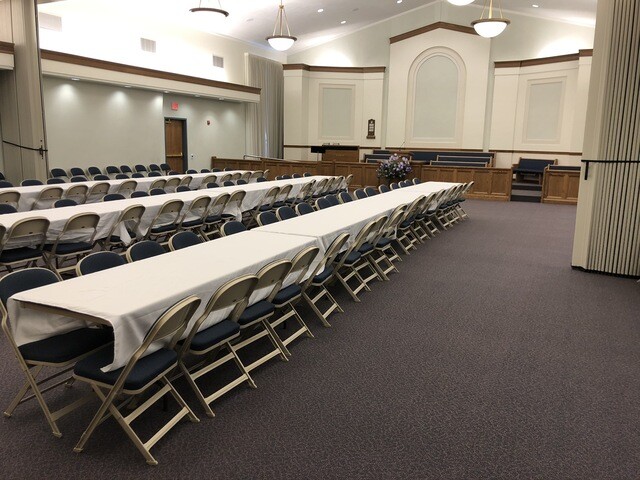
There are saints whose names are written in stained glass and history books. And then there are saints whose legacy is marked by the faint squeak of metal hinges and the stubborn pinch of fingers caught where the chair folds. These are the saints of the folding chairs.
You know them. They’re the folks who slip into the hall ten minutes before everyone else, setting up neat rows of chairs so the Bible study doesn’t become a game of musical chairs. Or they’re the ones who stay after the potluck, while the rest of us are locked in pitched theological debates over whose Jell-O salad had the most merit. These saints silently gather chairs, stack them in teetering towers, and roll them away with the reverence of a medieval procession—except with slightly more clanging.
Folding chairs are, in their own way, profoundly theological. They remind us that the Church is not built solely on sermons or hymns, but on the humble labour that makes space for community to happen. Every vestry meeting, every funeral tea, every youth group pizza night rests (quite literally) on someone’s willingness to haul out a chair. Without them, we’d be standing awkwardly, balancing our paper plates, trying not to spill coffee on the carpet.
I recall one church supper where the crowd was so large that we ran out of chairs altogether. We pressed into service the piano bench, a step stool, and what I am fairly sure was a flower stand that never quite recovered. It was a moment of creative community—but it also reminded us just how unnoticed the quiet ministry of the folding chair really is.
Theologically, folding chairs whisper to us about servanthood. Jesus washed feet; today, it might be setting out chairs in the parish hall. Nobody applauds, nobody takes pictures for the parish newsletter, and nobody writes a hymn about it (though I confess, I’d pay good money to hear “All Glory Be to Thee, O Chair Committee”). But there in the unnoticed work, Christ is present.
So the next time you walk into a perfectly arranged hall, or slide into a chair that someone else unfolded for you, give thanks for the ministry of the folding chairs—and for the quiet saints who keep our community from sitting on the floor. And for those who step up to do this holy servant ministry, it is indeed very scriptural. In 1 Peter it says for example, “Like good stewards of the manifold grace of God, serve one another with whatever gift each of you has received.”
Because when all is said and done, the kingdom of God is not only built on lofty theology and soaring hymns. Sometimes it is built one folding chair at a time, squeaking faithfully into place. And as Paul reminds us, “Whatever you do, work at it with all your heart, as working for the Lord, not for human masters” (Colossians 3:23). Even the quiet work of setting up chairs is holy when done in love, for it prepares a place where God’s people may gather, and where Christ himself is in the midst.
Prayer
Servant Lord,
we thank you for the quiet ministries that hold our communities together—
for the chairs unfolded, the tables set, the coffee poured,
and all the unnoticed work done in love.
Bless those whose hands serve quietly,
whose labour makes space for welcome and fellowship.
Teach us to see holiness in the humble tasks,
and to serve one another with joy,
that every chair, every gesture,
may become part of your kingdom work.
Through Jesus Christ,
who calls us not to be served but to serve.
Amen.